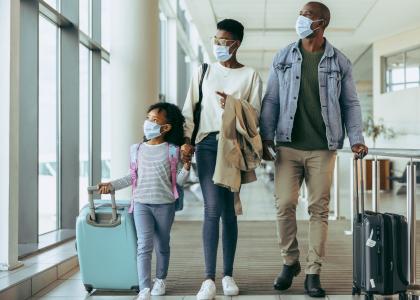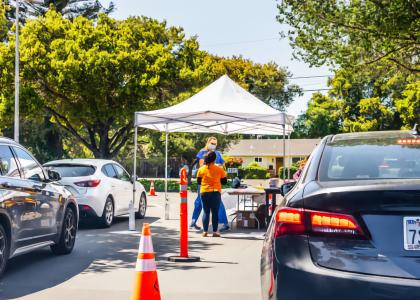Economic
Tracing the Health Consequences of Family Support during the COVID-19 Pandemic

This project fills this gap in the research creating a multidimensional contextual database linked to the Health and Retirement Study (HRS) and the Panel Study of Income Dynamics (PSID) to examine the effects of the pandemic across generations of American families. The HRS and PSID have collected data on the health and well-being of individuals and their family members for decades.
Mitigating Effects of Telehealth Uptake on Disparities in Maternal Care Access, Quality, Outcomes, and Expenditures During the COVID-19 Pandemic

Telehealth represents a promising opportunity to reducing disparities in maternal health access, quality, and outcomes, given its substantial range of opportunities.
The Longitudinal Impact of the COVID-19 Pandemic and Related Multi-Level Mitigation and Contextual Factors on Health and Socioeconomic Outcomes of Individuals and Families From a Vulnerable Population

A “shovel ready” project leveraging the existing longitudinal data collected in the Fragile Families and Childhood Wellbeing Study (FFCWS), the longest running population-based US birth cohort, collected before and throughout the pandemic linked with multilevel COVID-19 related health, social and economic measures, and prospective COVID-19 impact assessments to examine these issues.
Optimizing Access, Engagement and Assessment to Elucidate Prenatal Influences on Neurodevelopment: The Brains Begin Before Birth (B4) Midwest Consortium

This study enrolls pregnant and postpartum women into a multi-wave study to assess medical, economic, psychosocial and substance use risk across pregnancy and the perinatal period, studying associations of these factors to infant neurobehavioral development during the first year of life.
A New Database to Measure the Association Between Income, Race, and Mortality: Inequality in Longevity During and Beyond the COVID-19 Pandemic Disparities

This project will build a public database of mortality rates incorporating socioeconomic and demographic variables across the U.S. population. Researchers will be able to analyze the sources of disparate impacts of COVID-19 on mortality across subgroups, with the aim of understanding how to reduce health inequality.
The Health and Economic Impacts of COVID-19 and Policy Responses

This project develops, estimates, and simulates a cutting-edge model of the health and economic impacts of the COVID-19 pandemic and policy responses to it.
COVID-19 Supplement to a Computational Examination of Threat and Reward Constructs in a Predominantly Low-Income, Longitudinal Sample at Increased Risk for Internalizing Disorders

This project will study how COVID-19 is impacting mental health in marginalized, low-income, minority populations. Moreover, it will document the way in which resilience factors, including social support, economic policies, and family resources, moderate the negative effect of COVID-19 related stressors on mental health.
Socio-Cultural Stress Profiles, Stress Responses, and Health in Mexican American Adolescents

This project examines ways in which the COVID-19 pandemic amplifies the socio-cultural stressors and health disparities experienced by Mexican-origin, low-income adolescents who are making the transition to young adulthood.
Fragile Families and the Transition to Adulthood

This project collects new data specific to the Fragile Families and Child Wellbeing Birth Cohort Study (FFCWS) young adults’ health, wellbeing, and environments in the context of the pandemic.
Toward Next Generation Data on Health and Life Changes at Older Ages

This administrative supplement continues a high-frequency longitudinal survey of Americans’ experiences and behavior during the COVID-19 pandemic to measure perceptions of coronavirus risk, individual prevention behaviors, consumption of coronavirus information from various sources, effects on households' financial situations and physical and mental health, and coping behavior of households.